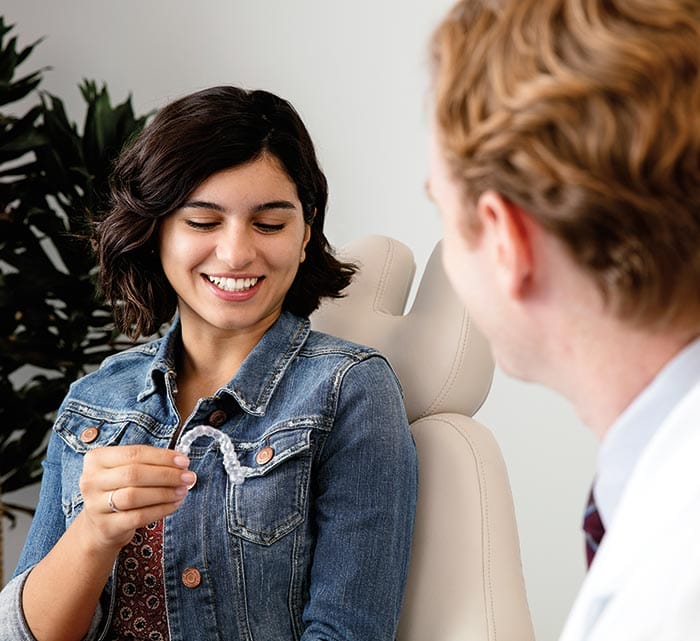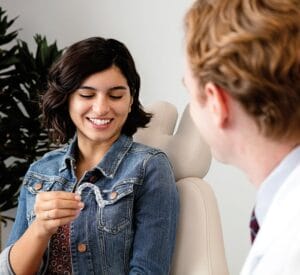Now you’ve started your Invisalign journey and you’re ready to go. Here’s a brief overview of some Invisalign first-week tips so you know what to expect, from the very first day.
At Image Orthodontics, we review a few crucial steps that will make sure your treatment runs as smoothly as possible:
- Learn how to remove and insert your trays while you’re in the chair. It may seem easy, but practicing in the office can help you avoid a lot of fumbling around at home.
- Make sure you are wearing your aligners all the time. It’s easy to keep snacking and sipping on coffee, etc., & forget to put them back in.
- Keep everything CLEAN, including your mouth, your aligners, and your case.
Ever since Invisalign was first introduced in the early 2000s, it has changed how we practice orthodontics. As the original form of clear aligner treatment, Invisalign has given orthodontists a way to correct bite issues without brackets or wires. Although braces are still a valuable and highly effective treatment option, Invisalign has won over millions of patients thanks to its discreet look and convenient tray system.
In contrast to braces—which stay attached to your teeth until treatment ends—Invisalign clear aligners can be removed at any time. At the beginning of treatment, you will be given a series of custom-made aligners. Each tray is designed to move teeth in a specific direction. You will wear each tray for 4-14 days before progressing to the next one. Once you have reached the end of your aligner set, you’ll be the proud owner of a perfectly straight smile!
Of course, Invisalign patients must follow certain rules and best practices to guarantee success. If you’re about to begin wearing clear aligners for the first time, follow these Invisalign first-week tips to start your treatment off the right way.
What to Expect Your First Few Weeks with Invisalign
As mentioned, Invisalign aligners can be removed at any time. Because your aligners are not fixed, you can enjoy a number of conveniences that braces do not allow. For example, patients with braces cannot eat certain foods to avoid damaging brackets or wires. As an Invisalign patient, you have no such limitations. Simply remove your aligners before every meal and you are free to eat whatever you want!
Removable aligners offer additional benefits as well, including:
- Simple Oral Care. With Invisalign, you don’t need to alter your brushing and flossing routine. Just brush two times a day and floss at least once daily to keep your smile healthy and cavity-free.
- Orthodontic Appliance-Free Pictures. Invisalign aligners are completely transparent, making it hard for others to see—or sometimes even notice—that you are undergoing orthodontic treatment. However, if you want to look completely aligner-free at a wedding or other important social event, you can remove your aligners before people start snapping pictures.
In addition to these benefits, you should be prepared for a couple of mild inconveniences. Remember, clear aligners are physically pushing your teeth into new positions. As a result, you can expect at least some of the following effects.
Aligners May Feel Tight
If you are expecting your aligners to feel like a mouthguard, you will likely be surprised by how tightly they fit around your teeth. Each aligner is custom-designed to shift teeth in specific directions and preserve overall progress. To accomplish this, aligners must fit closely around your teeth. Don’t be alarmed—after a day or two, once the aligner has shifted your teeth a bit, it will have a more relaxed feel.
Expect Mild Pressure
As your aligners start to move your teeth, you should expect to feel a bit of tenderness in your gums and slight pressure on your jaw. This is a good thing: if you didn’t feel any tenderness, your aligners wouldn’t be working!
Gum and jaw discomfort is most pronounced at the beginning of treatment. After the first week, you will feel decreased pressure as your mouth becomes accustomed to the feel of your aligners. To minimize pressure, we recommend:
- Eating soft foods whenever your mouth feels tender or sore (e.g., smoothies, soup, eggs, etc.)
- Wearing your first tray at night so you can sleep through the initial pressure.
- Massaging your gums.
- Chewing sugar-free gum.
Your Speech May Sound Different
Like braces, Invisalign can improve your speech once treatment is over. You may sound a bit funny at the beginning, though. Many patients report a slight lisp as treatment begins, but it quickly subsides after practicing their speech for a day or two.
Some patients also report changes in how they hear themselves speak during treatment. They often compare it to hearing themselves on a voice recording. “It sounds like me, but it doesn’t really sound like me.” In these cases, the patients said that others couldn’t perceive a difference, but it took them a little while to get used to the new sounds themselves.
First Week- Best Habits
Now that we’ve covered what to expect during your initial days of treatment, we can focus on how to make the most out of your first week. Follow these Invisalign first-week tips to establish good habits that will guide you throughout the treatment process.
Track How Often You Wear Your Aligners
We cannot stress this enough. You must wear your aligners for 20-22 hours a day if you want to see results. We know it’s tempting to take a little “aligner-free” time after a meal or after you brush your teeth, but you must wear them as often as possible to keep your treatment on track.
For best results, you should keep a log or use the Invisalign App to record how often you are wearing your aligners. Though you should aim for 22 hours, you’ll still be ok if you wear them for at least 20 hours per day. Once you become accustomed to wearing aligners throughout the day, you won’t need to log your time as often.
Always Carry an Invisalign Case
Once removed, Invisalign aligners are surprisingly easy to lose. Even when eating at home, you can quickly lose your aligners, even without leaving the kitchen table. Moreover, it’s tempting to place aligners in convenient—but dirty—places, like countertops and pants pockets.
If you make a habit of keeping a carrying case with you at all times, you will always have a safe, hygienic space to store your aligners.
*Always keep your trays away from pets.
Make Oral Hygiene a Top Priority
Good oral hygiene will help your teeth move more quickly during treatment. For optimal results, remember to brush once in the morning, once at night, and floss at least once a day. After meals, you should rinse your mouth out before replacing your aligners. Finally, you should clean your aligners daily:
1. Rinse your aligners under cool or lukewarm water from your faucet.
2. Gently scrub the inside and outside of the tray with your toothbrush.
3. Use Axelrode Orthodontics Cleaning Foam, cleaning tablets or a sonic cleaner to clean them.



